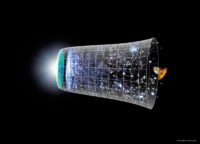By Creation Moments Why are chimps so similar to humans? They have five fingers on each hand, like we do, and five toes on each foot. They have facial expressions a bit like us. read more …read more Read more here: Creation Moments
By Creation Moments In a previous Creation Moments broadcast, we looked at why chimps and humans have similar features, and showed that it is because they have a common designer. Evolutionists use the similarities between organisms to suggest proof of descent from common ancestors. This is illogical. Let me explain a little logic. Suppose I use this syllogism: read more …read more Read more here: Creation Moments
By Creation Moments We do not believe that God created the Universe because of evidence. We believe it, because that is what God said in His Word. Having presupposed the obvious truth of God’s Word, we notice that any evidence observed and collected is consistent with what we know of the truth of God’s Word. read more …read more Read more here: Creation Moments
By schaffee On this episode of ID the Future, Ray Bohlin interviews Jonathan Wells on his recent book, Zombie Science. Listen in as Wells discusses vestigial organs and how textbooks retain incorrect ‘proofs’ for evolution decades after research has shown them false. And what are human tails – and what do they have to do with evolution? Your browser does not support playing Audio, please upgrade your browser or find our podcast on podOmatic Download Episode …read more Read more here: id the future
By Creation Moments Uniformitarianism is a big word to describe the prevailing scientific philosophy of the world. It is the idea that everything in nature has proceeded in a regular and smooth fashion since the start of the Universe. read more …read more Read more here: Creation Moments
By Creation Moments Some Christian apologists believe that all Christians should accept the Big Bang theory. They say that the Big Bang theory has been proved, and that at least it tells us that the universe had a definite beginning. They use this as part of a logical syllogism, which they claim proves God. It runs as follows: Everything that has a beginning has a cause. The universe had a beginning. read more …read more Read more here: Creation Moments
By schaffee It’s easy to win the game when you can move the goalpost. On this episode of ID the Future, biologist and Discovery Institute Senior Fellow Jonathan Wells explains how Darwinism, unlike football, has only one rule: survival of the fittest. The fittest are those who survive, and Darwinists are determined to survive at all costs–even if it means moving the goalpost. Your browser does not support playing Audio, please upgrade your browser or find our podcast on podOmatic Download Episode …read more Read more here: id the future
By Creation Moments A whale got stuck in the middle of London, England, in 2006. The bottle-nosed whale swam up the River Thames. Attempts to rescue the confused animal led to its death, and an unusual outpouring of popular grief in the UK’s capital. read more …read more Read more here: Creation Moments
Christian astrophysicist Dr. Luke Barnes (University of Sydney) speaks to the Apologetics Academy about the evidence for God from the fine-tuning of the initial parameters and constants of our Universe.
By Creation Moments The Moon has always fascinated me, as it hangs there in the sky, the only extra-terrestrial world where some of its surface features can be seen with the naked eye. read more …read more Read more here: Creation Moments
By Creation Moments A report in a British newspaper about 10 years ago suggested that dinosaurs may have died out, because they picked up diseases from insect bites, with which they were not able to cope. Previously, it had been an article of faith for over 20 years that dinosaurs had died out as a result of a massive asteroid strike on the Earth, supposedly at Chicxulub, Mexico. read more …read more Read more here: Creation Moments
By Creation Moments I loved the zoo, when I was a boy. How we used to laugh at the antics of the chimpanzees at their “tea parties”! We were amused that they wore clothes, as they performed activities that looked vaguely human. Well, we kept on laughing, until we decided that it was an improper anthropomorphism, and the events were banned. read more …read more Read more here: Creation Moments
By Creation Moments Was there a time, when large parts of the Earth’s surface were so cold, that they were covered with ice sheets? Many U-shaped valleys throughout northern Europe and North America show markings somewhat similar to the impressions left today by moving glaciers – “rivers” of ice. read more …read more Read more here: Creation Moments
By schaffee On this episode of ID the Future, Ray Bohlin interviews Jonathan Wells about Zombie Science. Wells discusses the tree of life, the Miller-Urey experiment, and more. What does Wells mean when he says that the DNA “molecule has been invested with far more power than it actually has”? Listen in to find out! Your browser does not support playing Audio, please upgrade your browser or find our podcast on podOmatic Download Episode …read more Read more here: id the future
By schaffee On this episode of ID the Future, CSC Director of Communications Rob Crowther interviews CSC Senior Fellow Jay Richards. Listen in as Richards rebuts the warfare thesis – the idea that religion and science are antagonists – and argues that historically, Judeo-Christian culture “was the seedbed from which science emerged.” Has science missed out by being partnered with materialism? Your browser does not support playing Audio, please upgrade your browser or find our podcast on podOmatic Download Episode …read more Read more here: id the future
By schaffee On this episode of ID the Future, Tod Butterfield interviews CSC Program Officer in Education and Public Policy Sarah Chaffee. Listen in as Chaffee shares about the TEKS streamlining process and the push to gut good standards of critical analysis of evolution. The Board votes this week (meeting is April 18-21)! If you’re from Texas, learn how you can help. Your browser does not support playing Audio, please upgrade your browser or find our podcast on podOmatic Download Episode …read more Read more here: id the future
By schaffee On this episode of ID the Future, Discovery Institute Fellow Ray Bohlin interviews climate statistician William (Matt) Briggs about the upcoming March for Science. Listen in as they discuss the reaction to the Trump administration’s stance on global warming, the March diversity statement, and other ways this event is focused on politics – not science. Your browser does not support playing Audio, please upgrade your browser or find our podcast on podOmatic Download Episode …read more Read more here: id the future
By schaffee On this episode of ID the Future, CSC Director of Communications Rob Crowther interviews CSC Senior Fellow Jay Richards on the upcoming March for Science and the CSC’s partnership with Stream.org to provide critical analysis of the April 22 event. Listen in as Richards discusses the controversy over the politics of the march, and why arguments from consensus should set off your baloney detector. Your browser does not support playing Audio, please upgrade your browser or find our podcast on podOmatic Download Episode …read more Read more here: id the future
By Creation Moments One well-known pastor has recently stated that, if we ask our young people to believe something, because “The Bible tells me so”, then we are creating a house of cards religion. What happens, he asks, when they go to college and find that the walls of Jericho did not really come down, or that what they have been told about the world being created in 6 days is at odds with the fact that the universe is 14.7 billion years old? read more …read more Read more here: Creation Moments
By Creation Moments When is a day a day? And when is a day not a day? Are the days really 24 hours long? Let’s look at that well-known Bible passage that tells you about the first day, second day and so on. I am referring to Numbers 7. read more …read more Read more here: Creation Moments
By Creation Moments We are used to evolutionists getting certain aspects of science wrong. But sometimes we are not aware of how words and phrases of bias can be slipped through unnoticed. read more …read more Read more here: Creation Moments
By Creation Moments Why did Charles Darwin take so long to publish his Origin of Species? His Beagle journal was published in 1839, but Origins was published 20 years later, in 1859. And why was Darwin in such a hurry in 1858 to get his book finished and published? A book by Roy Davies, entitled The Darwin Conspiracy, suggests that Darwin was guilty of plagiarism. read more …read more Read more here: Creation Moments
By Creation Moments Why did God accept Abel’s offering, but not Cain’s? As a child, I just couldn’t get it. They both brought offerings to God. Why did God show such favoritism? I was told by teachers at elementary school that we should do the best we could for God. God deserves the best. But didn’t Cain bring to God the very best of his crops? read more …read more Read more here: Creation Moments
By schaffee On this episode of ID the Future, Brian Miller, CSC Research Coordinator, interviews Paul Nelson, CSC Senior Fellow and philosopher of science, on universal common ancestry. Listen in as Nelson describes how common descent predicts one – and only one – genetic code. Yet, this is not what we find. Your browser does not support playing Audio, please upgrade your browser or find our podcast on podOmatic Download Episode …read more Read more here: id the future
By schaffee On this episode of ID the Future, Casey Luskin sits down with Senior Fellow Dr. Michael Denton for a discussion of paradigm shifts in science. Dr. Denton reflects on paradigm shifts that he’s witnessed in his lifetime and how his own thinking has changed over the years, and also looks at how these shifts challenge Darwinian evolution in new ways. Your browser does not support playing Audio, please upgrade your browser or find our podcast on podOmatic Download Episode …read more Read more here: id the future
By schaffee On this episode of ID the Future, Dr. Brian Miller examines evolutionary explanations for the development of the eye. What is needed to build a complex eye? And how long would it take to get the necessary coordinated mutations? Miller argues the eye presents multiple insurmountable problems for evolution. Your browser does not support playing Audio, please upgrade your browser or find our podcast on podOmatic Download Episode …read more Read more here: id the future
By Creation Moments It must have made a tremendous noise, when the Earth’s crust cracked into pieces. read more …read more Read more here: Creation Moments





















